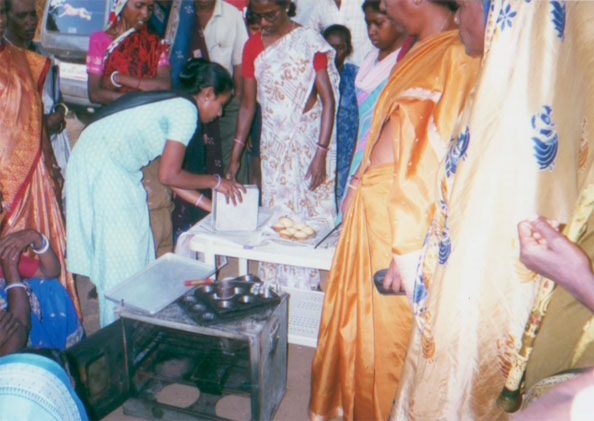Experience: Quotes
“Before the capacity building efforts organized by ICPRD project, we were running our groups but the concepts and procedures involved were not clear to us. As a result even for organizing our monthly meetings within the group we were dependent upon the facilitators from the NGO. But with the inputs given during the training to our group leaders and most importantly to our members regarding management of our groups, now to a great extent it is possible to handle internal operation of the group independent of the NGO representatives.
“Prior to the formation of the SHGs we used to take loans from the local sahukars. The need for the loans was very frequent for managing irregular income stream especially as they were dependent upon income from the agricultural sector and for social and religious obligations. The sahukars used to charge interest rate as high as 20-25% per month and if the loan amount was large, he required assets as guarantee. As sahukars were the only option available to us, we eventually ended up in a vicious debt cycle”. |
Gonnia Devi, Leader, Ganga Sagar SHG, Madhupur |
“We are interested in taking up loan from the bank but if the bank is not responding to our requirements then to some extent we are able to meet our credit needs with the savings in hand. With the small savings in hand we have initiated our small enterprises and some of our members have met their emergency needs but we are still looking for an external source of loan either from a MFI or NGO so that we can develop our enterprise further.” |
A SHG Leader |
“ It is not just problem of support structures, which is required for working in the special field, are like roads, transportation, government support, donor agency’s cooperation and flexibility. The first and foremost step is to bring in changes in the thinking process and attitudes of the beneficiaries. Today it looks easy to go into the villages and sit with the villagers and talk in these tribal areas but the situation earlier was different. Establishing trust, organizing them into groups with a vision of self reliance was not one time exercise. The NGOs had to face resistance and sometimes had to confront the existing power structures in Adivasi village to introduce concepts and practices as against the exploitative structures already existing. It takes constant motivation, commitment and networking to bring about change and channelise properly available resources in Santhali society in Jharkhand”. |
Rural Tribal Development Foundation, Dumka (partner NGO) |
Impact on NGOs
As a result of training provided, the partner NGOs are now in a position to manage and develop effective linkage between micro finance institutions. This training also helped to devise qualitative and effective participatory monitoring measures, which can ensure SHGs as tools for social change. Training also helped to understand the process of women empowerment through micro-credit as well as initiation of designing and evaluation of programme strategically. Through discussions during training sessions, NGO leaders also understood the method through which they could analyze the local economy and integrate it to develop and empower the SHGs.
Impact on SHG Leaders
Capacity building TOT workshops helped support the SHG leaders in establishing linkages with MFIs and other institutions. These leaders have now been initiated to analyze the local economic structures and resources and its integration in the various SHG activities as well as in strategic planning for the groups based on various resources and skills.
Impact of Exposure Visit for SHG leaders and NGO staff
ICPRD’s training ideology for organizing these exposure visits in collaboration with the grassroots organizations was to base its learning on current best practices so that the women’s credit groups can be used as an instrument for social change and empowerment through participatory techniques.
Group leaders, members, NGO staff and functionaries felt this approach of ICPRD as Exposures expanded their vision on how groups can play more important roles and take up village based issues and also play an active role in eradicating poverty through rotating group savings and bank support in village based livelihood (skilled, non-skilled and traditional). They observed that it had given them an opportunity for reflection and discussion on issues and problems with regard to the functioning and management of Self Help Groups, serving as a platform for further enhancing their capacities.
Above all, linkage with the financial institutions accelerated among the members and groups as a result of the exposure visits.
Participants expressed great enthusiasm at experiencing, first hand, the functioning and activities of different SHG groups.
One participant observed – “We always believed that the SHG group existed only to raise loans, do business and earn profits. It is only here that we have leant that this is only the beginning. The essence is to address social issues and fight for women’s rights and independence.” |

Dr. Kaushlendra Kumar, Secretary, SKVP, said that ICPRD laid the foundation of Self Help Groups in this region in 1996 and today the results are there for everyone to see. It is evident that only economic strength leads to a strong social structure. In this context, he cited an example of a village in dealing with the Naxalite problem: When a bridge was being built in a village of Bihar, the Naxalites stopped its construction, demanding money. When the SHG group women learnt of it, they volunteered to work on the bridge. When the armed Naxalites came to stop the work, the women were not frightened. Instead, they asked them: “For whose rights are you fighting?” They replied: “For the sake of the poor.” The women said: “So we are the poor you espouse to be representing. This is our work. We are earning our livelihood through this.”
“How did they acquire such courage?” asked Dr. Kaushlendra Kumar. “Where even governments fail, it is these women groups that are exhibiting great success,” he continued. |
<<PREVIOUS NEXT >>
|



